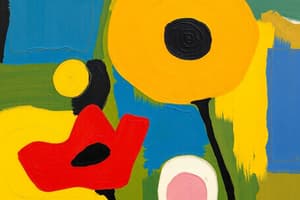Podcast
Questions and Answers
Match the following literary devices with their usage in the poem 'Daddy' by Sylvia Plath:
Match the following literary devices with their usage in the poem 'Daddy' by Sylvia Plath:
Metaphor = Comparing the speaker's father to a Nazi Imagery = Depicting men as vampires Wordplay = Describing the speaker's relationship with her father Symbolism = Representing the speaker as a victim of her father
Match the following themes with their representation in the poem 'Daddy' by Sylvia Plath:
Match the following themes with their representation in the poem 'Daddy' by Sylvia Plath:
Paternal oppression = Comparison of the father to a Nazi Gender dynamics = Depiction of men as vampires Psychological trauma = The speaker's relationship with her father Identity struggle = The speaker's representation as a victim
Match the following characters with their symbolic representation in the poem 'Daddy' by Sylvia Plath:
Match the following characters with their symbolic representation in the poem 'Daddy' by Sylvia Plath:
The speaker's father = Representation as a Nazi The speaker = Depiction as a victim Men in general = Metaphorical portrayal as vampires Husband = Shifting from Nazis to vampires
Match the following emotions with their portrayal in the poem 'Daddy' by Sylvia Plath:
Match the following emotions with their portrayal in the poem 'Daddy' by Sylvia Plath:
Match the following tones with their manifestation in the poem 'Daddy' by Sylvia Plath:
Match the following tones with their manifestation in the poem 'Daddy' by Sylvia Plath:
Flashcards
Imagery
Imagery
Descriptive language appealing to the senses, evoking a mental picture or sensation.
Metaphor
Metaphor
A comparison between two unlike things without using 'like' or 'as'.
Allusion
Allusion
A reference to a well-known person, place, event, literary work, or work of art.
Personification
Personification
Signup and view all the flashcards
Symbolism
Symbolism
Signup and view all the flashcards
Study Notes
Literary Devices in 'Daddy'
- Imagery: used to describe the speaker's feelings towards her father, e.g. "You died before I had time --- /Marble-heavy, a bag full of God"
- Metaphor: compares the speaker's father to a Nazi, "You / Stand at the blackboard, daddy, / In the picture I have of you, / A cleft in your chin instead of your foot"
- Allusion: references the Holocaust, "An engine, an engine / Chuffing me off like a Jew"
- Personification: gives the speaker's father human-like qualities, "I have had to kill you. / You died before I had time"
- Symbolism: uses the father's shoe to symbolize the speaker's feelings of oppression, "I have had to kill you. / You died before I had time --- /Marble-heavy, a bag full of God"
Themes in 'Daddy'
- Electra Complex: speaker's obsession with her father, "I have had to kill you. / You died before I had time"
- Guilt and Anger: speaker's emotions towards her father's death, "It's not your fault / It's not my fault / It's not"
- Feminism: speaker's struggle to break free from patriarchal oppression, "The black telephone's off at the root, / The voices just can't worm through"
- Identity: speaker's search for self, "I have had to kill you. / You died before I had time"
Symbolic Characters in 'Daddy'
- The Father: symbolizes patriarchal oppression and the speaker's feelings of guilt and anger
- The Nazi: represents the speaker's feelings of oppression and persecution
- The Speaker: symbolizes the struggle for identity and independence
Emotions in 'Daddy'
- Anger: towards the speaker's father, "I have had to kill you. / You died before I had time"
- Guilt: towards the speaker's father's death, "It's not your fault / It's not my fault / It's not"
- Fear: of the speaker's father, "You died before I had time --- /Marble-heavy, a bag full of God"
- Resentment: towards the speaker's father, "I have had to kill you. / You died before I had time"
Tones in 'Daddy'
- Angry: "I have had to kill you. / You died before I had time"
- Sarcastic: "It's not your fault / It's not my fault / It's not"
- Ironic: "You died before I had time --- /Marble-heavy, a bag full of God"
- Resentful: "I have had to kill you. / You died before I had time"
Studying That Suits You
Use AI to generate personalized quizzes and flashcards to suit your learning preferences.




